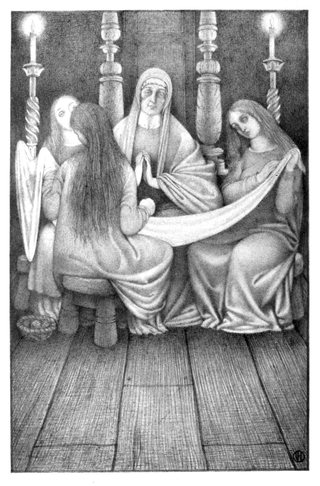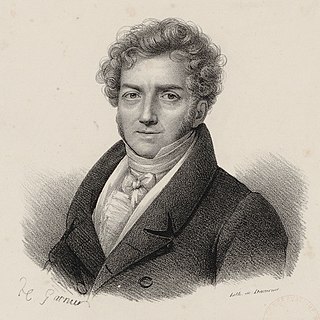This article relies largely or entirely on a single source .(March 2015) |
Brown Adam (Roud 482, Child 98) is an English-language folk song. [1]
This article relies largely or entirely on a single source .(March 2015) |
Brown Adam (Roud 482, Child 98) is an English-language folk song. [1]
Brown Adam, a smith, is exiled from his family. He builds a house in the woods for himself and his lady. One day, he goes hunting. He returns home to find his lady with a knight—or king's son—trying to persuade her to leave Brown Adam. She refuses many rich bribes; she will stay with Brown Adam. When he starts to threaten her, Brown Adam makes himself known and maims him, cutting off his hand.
Maid Marian is the heroine of the Robin Hood legend in English folklore, often taken to be his lover. She is not mentioned in the early, medieval versions of the legend, but was the subject of at least two plays by 1600. Her history and circumstances are obscure, but she commanded high respect in Robin’s circle for her courage and independence as well as her beauty and loyalty. For this reason, she is celebrated by feminist commentators as one of the early strong female characters in English literature.

Aurora Leigh is an 1856 verse novel by Elizabeth Barrett Browning. The poem is written in blank verse and encompasses nine books. It is a first-person narration, from the point of view of Aurora; its other heroine, Marian Erle, is an abused self-taught child of itinerant parents. The poem is set in Florence, Malvern, London and Paris. The work references Biblical and classical history and mythology, as well as modern novels, such as Corinne ou l'Italie by Anne Louise Germaine de Staël and the novels of George Sand. In Books 1–5, Aurora narrates her past, from her childhood to the age of about 27; in Books 6–9, the narrative has caught up with her, and she reports events in diary form. The author styled the poem "a novel in verse", and referred to it as "the most mature of my works, and the one into which my highest convictions upon Life and Art have entered". The scholar Deirdre David asserts that Barrett Browning's work in Aurora Leigh renders her "a major figure in any consideration of the nineteenth-century woman writer and of Victorian poetry in general". John Ruskin called it the greatest long poem of the nineteenth century.
Willie's Lady is Child ballad number 6 and Roud #220. The earliest known copy of the ballad is from a recitation transcribed in 1783.

"Lord Thomas and Fair Annet", also known as "Lord Thomas and Fair Eleanor", is an English folk ballad.
King Estmere is an English and Scottish Child ballad and number 60 of 305 ballads collected by Francis James Child.
"The Fair Flower of Northumberland" is a folk ballad.
The Bent Sae Brown is an English-language folk song.
The Lord of Lorn and the False Steward, sometimes simply The Lord of Lorn, is an English-language folk ballad. The ballad was first entered in the Stationers' Register in 1580, with a note that it is sung to the tune of Greensleeves.
Lady Elspat is an English-language folk song.
The Bonny Birdy is an English-language folk song.
Willie and Lady Maisry, also known as William and Lady Marjorie, is an English-language traditional folk song, likely originating in Scotland. In the liner notes to folk musician Joe Rae's recording of this song, Rod Stradling writes that "Joe believes that the ballad is set in the area around Selkirk—possibly at Thirlstane Castle, in Lauderdale, to the north-east of Selkirk."
Brown Robin is a traditional English-language folk song. The ballad tells the story of a king's daughter who brings her lover, Brown Robin, into the castle and back out without being discovered by the king. The second variant comes from the ballad "Love Robbie."
Crow and Pie is an English-language folk song. It is one of the oldest preserved ballads, dating to c. 1500. Pie is the now-obsolete original name for the magpie, a bird often connected with sorrow and misfortune. The crow is a scavenger, often thought of as feeding upon the bodies of men hanged or slain in battle, and thus associated with unhallowed and violent death.
Clerk Saunders is an English-language folk song, likely originating somewhere in England or Scotland. It exists in several variants.
"Brown Robyn's Confession" is an English-language folk song.
Will Stewart and John is an English-language folk song, catalogued as Roud 3973 and Child 107.

La dame blanche is an opéra comique in three acts by the French composer François-Adrien Boieldieu. The libretto was written by Eugène Scribe and is based on episodes from no fewer than five works of the Scottish writer Sir Walter Scott, including his novels Guy Mannering (1815), The Monastery (1820), and The Abbot (1820). The opera has typical elements of the Romantic in its Gothic mode, including an exotic Scottish locale, a lost heir, a mysterious castle, a hidden fortune, and a ghost, in this case benevolent. The work was one of the first attempts to introduce the fantastic into opera and is a model for works such as Giacomo Meyerbeer's Robert le diable (1831) and Charles Gounod's Faust (1859). The opera's musical style also heavily influenced later operas like Lucia di Lammermoor, I puritani and La jolie fille de Perth.

The Apple Tree is a series of three musical playlets with music by Jerry Bock, lyrics by Sheldon Harnick, and a book by Bock and Harnick with contributions from Jerome Coopersmith. Each act has its own storyline, but all three are tied together by a common theme and common references, such as references to the color brown. The first act is based on Mark Twain's The Diaries of Adam and Eve; the second act is based on Frank R. Stockton's "The Lady, or the Tiger?"; the third act is based on Jules Feiffer's Passionella. The working title for the evening of three musicals was Come Back! Go Away! I Love You!

Lady Chatterley is a 2006 French drama film by Pascale Ferran. The film is an adaptation of the 1927 novel John Thomas and Lady Jane, an earlier version of Lady Chatterley's Lover (1928), by D. H. Lawrence. It was released in France on 1 November 2006, followed by limited release in the U.S. on 22 June 2007 and in the UK on 24 August 2007.

The Lady is a 1925 American silent drama film starring Norma Talmadge and directed by Frank Borzage. Talmadge's own production company produced the film with distribution by First National Pictures.